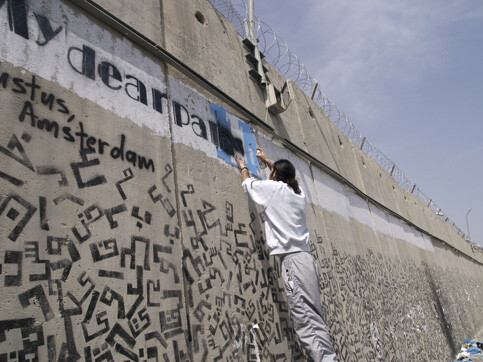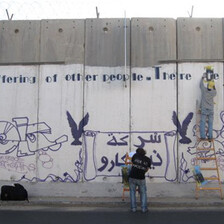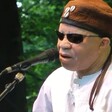The Electronic Intifada 20 April 2009

Al-Ram, occupied West Bank, April 2009. (http://www.sendamessage.nl/)
“My dear Palestinian brothers and sisters, I have come to your land and I have recognized shades of my own.” These are the first 20 words of an open letter written by Farid Esack, a South African scholar and political activist known for his role in the struggle against apartheid. The total length of his letter is 1,998 carefully chosen words in which he argues that the situation in Palestine is worse than it ever was in South Africa under apartheid rule. Esack, a black South African who worked closely with Nelson Mandela, is astonished at how ordinary people beat about the bush when it comes to Israel and the dispossession and suffering of the Palestinians. “Do ‘objectivity,’ ‘moderation,’ and seeing ‘both sides’ not have limits?” he asks. “Is moderation in matters of clear injustice really a virtue? Do both parties deserve an ‘equal hearing’ in a situation of domestic violence — wherein a woman is beaten up by a male who was abused by his father some time ago — because ‘he,’ too, is a ‘victim?’”
Almost five years after the International Court of Justice declared the wall that Israel built on Palestinian land “illegal” and ruled that it should be dismantled, Palestinians have started to spray-paint Esack’s letter along a three kilometer (1.85 miles) stretch of the structure. This is done as part of the Dutch-Palestinian collaborative project www.sendamessage.nl. Since 2007, this project has allowed Internet users from anywhere in the world to ask for an 80-character message to be spray-painted on the wall on their behalf, in exchange for a 30 euro ($40) donation. The bulk of the money raised supports small grassroots social, cultural and educational projects in Palestine. Some of the messages already sent vary from the romantic to the humorous to complete recipes. The messages remind Palestinians trapped inside the wall they have not been forgotten. Since its inception, more than 800 people from around the world have sent messages through sendamessage.nl.
Farid Esack’s open letter also aims to give Palestinians hope. “We stand by you in your vision to create a society wherein everyone, regardless of their ethnicity, or religion shall be equal and live in freedom,” he writes. “In the face of this monstrosity, the Apartheid Wall, we offer an alternative: Solidarity with the people of Palestine. We pledge our determination to walk with you in your struggle to overcome separation, to conquer injustice and to put end to greed, division and exploitation.”
“Esack passed the anger,” says Justus Van Oel, founder of Sendamessage.nl. “He reconciles and is able to identify with Palestinians. He is convincing and affects. A combination that is unique when it is about Palestine.”
Five years ago, Van Oel traveled to Palestine. He was shocked with what he saw and by “everything he obviously did not know or did not wanted to know.” Afterwards he traveled again to Palestine, this time accompanied by Dutch advertising professionals with whom he led a workshop together with creative, young Palestinians. The idea of Sendamessage.nl popped up at one of those workshops in Ramallah. Together with Faris Arouri and Yusef Nijim from the Palestinian Peace and Freedom Youth Forum, Van Oel developed the idea and implemented the project.
A year ago Van Oel asked Farid Esack to write an open letter. Because the project is independent, the painting of Esack’s letter will be entirely sponsored by donations received through the site. A documentary film was set to be filmed as the first 500 words were painted on 19 April on a stretch of wall south of Ramallah. The complete letter is expected to be in place on May 10.
“The wall won’t fall just because your text is written on it, true,” says Van Oel. “But these messages keep hope alive. Palestinians involved in this cooperation send with this a single message: ‘We are human beings, just like you, with sense of humor and lust for life.’ That is why we do this and enjoy it.”
Arjan El Fassed is cofounder of The Electronic Intifada and author of Niet iedereen kan stenen gooien (Uitgeverij Nieuwland, 2008).





